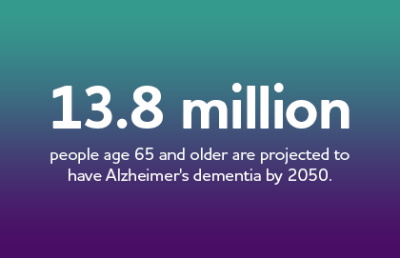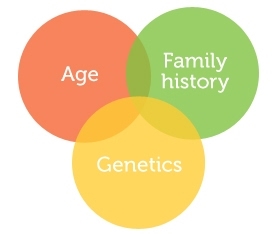An estimated 5.8 million Americans age 65 and older are living with Alzheimer's dementia in 2020. Eighty percent are age 75 or older.
Alzheimer's is
a complex disease that progresses over many years, like diabetes,
heart disease, and other chronic conditions. A number of may
increase or decrease a person's chances of developing the disease.
Women get the disease more often than men. Family history.
People who have a parent or sibling with Alzheimer's are more
likely to get it themselves.
These risk factors include age, family history and genetics.
Age
Age is the best known risk factor for Alzheimer's disease. The risk of developing the disease doubles every 5 years after age 65. Alzheimer's becomes increasingly common as people reach their 80s, 90s, and beyond. These facts are significant because the number of older adults is growing.
The U.S. Census Bureau estimates that Americans 65 and older will grow from 13 percent of the population today to nearly 20 percent in 2030. The group with the highest risk of Alzheimer's-those older than 85-is the fastest growing age group.
Family History
Another strong risk factor is family
history. Those who have a parent, brother or sister with
Alzheimer's are more likely to develop the disease. The risk
increases if more than one family member has the illness. When
diseases tend to run in families, either heredity (genetics),
environmental factors, or both, may play a role.
Genetics
The more researchers learn about Alzheimer's disease, the more
they realize that genes play an important role in its development.
Scientists have found genetic links to both early-onset and
late-onset Alzheimer's disease.
Early vs. Late Alzheimer's Onset
Early-onset Alzheimer's is rare, accounting for only about 5 percent of people with the disease. Its symptoms usually appear when people are in their 30s, 40s, and 50s. Most cases of early-onset Alzheimer's are familial, caused by mutations (permanent changes) in one of three known genes inherited from a parent.
Late-onset Alzheimer's disease, the most common type, typically becomes evident after age 60. The causes of late-onset Alzheimer's are not yet completely understood, but researchers have identified several risk-factor genes. One of those genes, called apolipoprotein E (APOE), has three forms, or alleles (ε2, ε3, and ε4).
One form, APOE ε4, increases a person's risk of getting the disease. It is present in about 25 to 30 percent of the population. However, carrying APOE ε4 does not necessarily mean that a person will develop Alzheimer's, and people without APOE ε4 can develop the disease.
Scientists have identified a number of other genes that may increase a person's risk for late-onset Alzheimer's. More studies are needed to assess the role these genes may play and to search for additional risk-factor genes. Knowing about these genes can help researchers more effectively test possible treatments and prevention strategies in people who are at risk of developing Alzheimer's-ideally, before symptoms appear.
Genetic testing cannot predict who will or will not develop late-onset Alzheimer's. Currently, it is used only in research settings and for people with a family history of early-onset Alzheimer's disease. This type of testing is not recommended for people at risk of late-onset Alzheimer's. It is not conclusive, and its primary value at this point remains in research settings.
Related Articles:
- Age Related Memory Loss: Possible Causes
- How to Choose an Alzheimer's Care Facility
- How to Pay for Memory Care
- What is Memory Care? Benefits of Memory Care Facilities
- Dementia and the Music Therapy Connection
- Signs & Symptoms of Sundowning
- The Montessori Method for Dementia Care
- Dementia vs. Alzheimer's Disease: What Is the Difference
- Aerobic Exercise and Dementia
- GPS Tracking Device's for Alzheimer's Patients
- Signs and Symptoms of Alzheimer's
Home | About | Articles | Resources | Site Map | Privacy Policy
Elder Options of Texas
Copyright
2001-2024
All Rights Reserved
DISCLAIMER: Links to other websites or references to products, services or publications do not imply the endorsement or approval of such websites, products, services or publications by Elder Options of Texas. The determination of the need for senior care services and the choice of a facility is an extremely important decision. Please make your own independent investigation.



